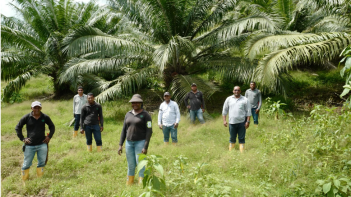Kuala Lumpur, 8 March 2012 – The RSPO successfully concluded its 8th General Assembly (GA8) today in Kuala Lumpur, Malaysia, after recently releasing staggering **2011 growth analysis showing year-on-year supply of Certified Sustainable Palm Oil (CSPO) up by 73% while year-on-year sales volume surged by a whopping 94%.
GA8 is held annually in accordance with the RSPO Statues and by-laws to discuss on-going resolutions that need to be deliberated and decided by all of the RSPO ordinary members.
The assembly witnessed highest ever presence from members all over the world in the history of the RSPO despite the aggressive membership growth in the past year which increased by over 30%. We had 58% quorum, more than the required 50% quorum. Due to the geographical spread of our membership base, 75% of the membership present at the GA8 was through proxy representation.
RSPO President and Global Director Sustainable Sourcing Development for Unilever, Jan Kees Vis, stated: “The increasing number of resolutions this year reflects the growing interest, participation and commitment of members. The resolutions that were passed by the General Assembly included one on the new Vision and Mission statement – “RSPO will transform markets to make sustainable palm oil the norm. The new mission statement reads: “RSPO will advance the production, procurement, finance and use of sustainable palm oil products; develop, implement, verify, assure and periodically review credible global standards for the entire supply chain of sustainable palm oil; monitor and evaluate the economic, environmental and social impacts of the uptake of sustainable palm oil in the market; engage and commit all stakeholders throughout the supply chain, including governments and consumers.”
“Even though there were a number of resolutions put forward by the growers from Malaysia (one collectively with Indonesia) that were voted against at the General Assembly, the Executive Board unanimously concluded that there was significant merit and value with these. The essences of these resolutions demonstrate the eagerness of the constituent to see enhanced governance and leadership; extended and balanced representation; refinement of constitutional requirements; and assertive plans to encourage the uptake of CSPO. We thank the growers for these strategic contributions. While some growers may have felt disappointed with the outcome of the GA8, the Executive Board would like to reassure the constituent that we are definitely committed to discuss and deliberate these many propositions to ensure that the fundamental concerns and reservations of the growers are addressed.”
“While the resolution on a moratorium for certification which was proposed by the MPOA was not passed, the validity of the concern of growers on their disappointment towards CSPO uptake is one that can be enhanced through the other resolution that was passed on enhancing time bound plan for every constituent including across stakeholder groups. This can be a platform to encourage affirmative response on the demand side of the supply chain.”
Today, the attending members at GA8 (including via proxies), passed 4 number of resolutions; voted against 7 number of resolutions; while 3 resolutions were withdrawn by the MPOA (Malaysian Palm Oil Association) out of a total 14 resolutions.
The resolutions that were passed at the GA8 today include:
Resolution 6a – the appointment of Pricewater House Coopers as the auditors for the financial year ending June 2012.
Resolution 6b – The members resolved to accept a new Vision Statement for the RSPO, which is “RSPO will transform markets to make sustainable palm oil the norm”. The members also resolved to accept new Mission Statements along with the new Vision Statement, which state that RSPO will: advance the production, procurement, finance and use of sustainable palm oil products; develop, implement, verify, assure and periodically review credible global standards for the entire supply chain of sustainable palm oil; monitor and evaluate the economic, environmental and social impacts of the uptake of sustainable palm oil in the market; engage and commit all stakeholders throughout the supply chain, including governments and consumers.
Resolution 6c – The members resolved to amend the quorum required within the statutes whereby the General Assembly shall be validly constituted if a minimum of 80 the Ordinary Members are present or represented.
Resolution 6m – The members resolved to accept that all RSPO ordinary members in the category of growers, traders/processors, consumer goods manufacturers and retailers be required to submit to the Secretariat a time bound plan to produce, trade, process and/or purchase and use 100% CSPO prior to the 9th General Assembly.
The resolutions that were voted against at the General Assembly include:
Resolutions 6d: The members voted against these resolutions to amend a number of articles of the RSPO Statutes on items related to the RSPO General Assembly and Extraordinary General Assembly.
Resolution 6f: sponsored by the MPOA and Indonesian growers – The members voted against the resolution that in order for a General Assembly to be valid and legitimate it must always have representation from every member category of the RSPO and the proportional representation of any quorum should be based on constituency.
Resolution 6g: sponsored by the MPOA – The members voted against the resolution to amend all relevant articles in the RSPO By-Laws and Statutes to require that the President of the RSPO is elected directly by the General Assembly from among those individuals already nominated by each membership category to represent them and have been elected to the Executive Board. In addition, the members also resolved that the term of the RSPO President to be limited to two consecutive terms.
Resolution 6h: sponsored by the MPOA – The members voted against the resolution to remove any and all ambiguity in the institutional governance and management of RSPO by clearly prescribing the roles and responsibilities of all governing and managing bodies in the RSPO and also to separate executive and non-executive functions in accordance with best institutional governance and practice and to, in effect, adopt a governance structure that is, or is equivalent.
Resolution 6j: sponsored by the MPOA – The members voted against the resolution on a moratorium on RSPO certification until such time as the supply and demand for CSPO is in balance in the market and that the period of moratorium is exempted from the time-bound plans of the companies concerned.
Resolution 6l: The members voted against the resolution to create a new category for transnational companies and Organizations to become Ordinary Members of RSPO, and which provides for one representative seat with a nominated Alternate from this new category on the Executive Board of RSPO.
Resolution 6n: Lastly, the members voted against the resolution to implement the elimination of all formulations of paraquat in the production of palm oil, and the rapid adoption of Integrated Weed Management. RSPO in cooperation with growers and NGOs shall implement the elimination in the use and purchase of all formulations of paraquat, and elimination of existing stocks of paraquat within one year.
These resolutions were withdrawn by the MPOA at the General Assembly:
Resolution 6i: was proposed by MPOA to protect the RSPO’s multi-stakeholder decision-making mechanism by making sure that all Standing Committees (SCs) must have proportionally representation for the Executive Board and Ordinary Members.
Resolution 6k: was proposed by MPOA to affirm RSPO’s commitment to its own Vision and Mission by no longer supporting any channel of offset, certificate or other trading that allows claims of sustainability to be made by, or ascribed to, anything other than actual, physical certified sustainable palm oil (CSPO) and any derivatives thereof.
At the General Assembly, there was also an election for the Executive Board Member representing the Environmental Non-Governmental Organization. The incumbent Tim Killeen from Conservation International (CI) was reelected to serve for another 2-year term on the Board.
“The agreement on the resolutions today certainly marked a significant progress for all RSPO members in continuing their efforts in achieving our collective goals in their respective markets. We hope that the adopted resolutions will bring our members to working together more closely and effectively towards sustainability.” RSPO Secretary General Darrel Webber concluded.
**RSPO recently released its inaugural qualitative review entitled: ‘2011 RSPO CSPO Growth Interpretation Narrative’ (GIN) – the first of its kind narrative for any sustainable commodity – an annual report aimed at recording and analysing the growth and trends of RSPO and CSPO in the global marketplace. It is available on www.rspo.org
— END —
About RSPO
In response to the urgent and pressing global call for sustainably produced palm oil, the Roundtable on Sustainable Palm Oil (RSPO) was formed in 2004 with the objective of promoting the growth and use of sustainable oil palm products through credible global standards and engagement of stakeholders. The seat of the association is in Zurich, Switzerland, while the secretariat is currently based in Kuala Lumpur with a satellite office in Jakarta.
RSPO is a not-for-profit association that unites stakeholders from seven sectors of the palm oil industry – oil palm producers, palm oil processors or traders, consumer goods manufacturers, retailers, banks and investors, environmental or nature conservation NGOs and social or developmental NGOs – to develop and implement global standards for sustainable palm oil.
Such multi-stakeholder representation is mirrored in the governance structure of RSPO such that seats in the Executive Board and project level Working Groups are fairly allocated to each sector. In this way, RSPO lives out the philosophy of the "roundtable" by giving equal rights to each stakeholder group to bring group-specific agendas to the roundtable, facilitating traditionally adversarial stakeholders and business competitors to work together towards a common objective and making decisions by consensus.
Keep reading

Access into prisma

Updated Trace Function in prisma

Call for Expression of Interest: Independent Investigation of a Complaint

Latin American Smallholders, Key Global Brands Gather in Peruvian Amazon to Advance Sustainable Palm Oil

RSPO Forum for Members and Certification Bodies 2025: Strengthening Capacities and Building Bridges with RSPO Members

From Violence to Prosperity: Cultivating Sustainable Palm Oil in San Pablo, Colombia

Palmas de Tumaco: Enduring, Trusting, and Transforming in Colombia’s Pacific Coast
Carry Over Credits for Certified Independent Smallholder Groups




